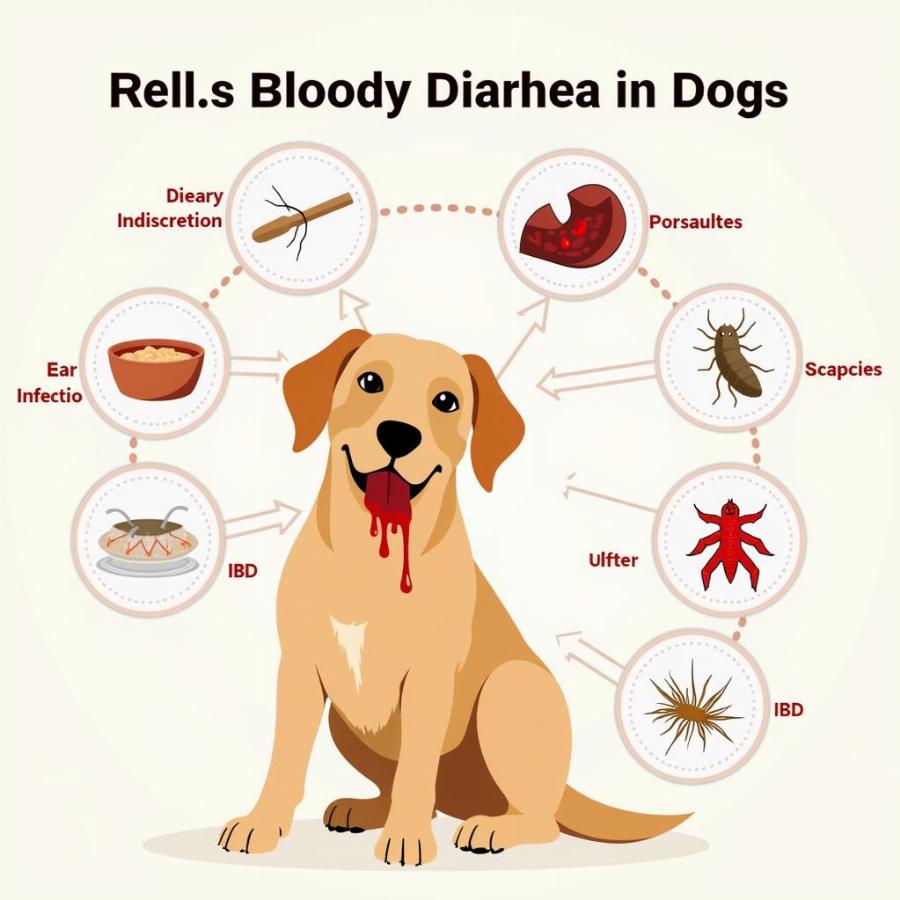A dog experiencing bloody diarrhea can be alarming, especially for first-time dog owners. It’s even more concerning when your dog seems otherwise healthy. This combination of bloody diarrhea and normal behavior in dogs can be caused by several factors, ranging from mild dietary indiscretion to more serious underlying health issues. Understanding the potential causes and knowing what steps to take is crucial for ensuring your dog’s well-being.
Decoding Bloody Diarrhea in Dogs with Normal Behavior
Bloody diarrhea, medically known as hematochezia, occurs when blood is present in a dog’s stool. If your dog has diarrhea with blood but acting normal, don’t panic, but don’t ignore it either. While they may seem fine now, the underlying cause could worsen. This seemingly normal behavior could be masking discomfort. It’s essential to monitor their behavior closely for any subtle changes.
Potential Causes of Bloody Diarrhea in a Seemingly Healthy Dog
Several factors can contribute to bloody diarrhea in dogs who otherwise appear healthy:
- Dietary Indiscretion: Eating something they shouldn’t, like spoiled food, garbage, or even certain plants, can upset their digestive system.
- Stress and Anxiety: Changes in routine, new environments, or even loud noises can cause stress-induced colitis, leading to bloody diarrhea.
- Parasites: Intestinal parasites, such as hookworms, whipworms, and coccidia, can irritate the intestinal lining and cause bleeding.
- Infections: Bacterial or viral infections can inflame the digestive tract, resulting in bloody diarrhea.
- Inflammatory Bowel Disease (IBD): IBD is a chronic condition that causes inflammation in the digestive tract.
- Cancer: While less common, certain types of cancer can cause bleeding in the digestive tract.
 Causes of bloody diarrhea in dogs
Causes of bloody diarrhea in dogs
When to Seek Veterinary Care
While some cases of bloody diarrhea may resolve on their own, it’s always best to consult a veterinarian, especially if the blood is bright red, the diarrhea is frequent or severe, or your dog exhibits any other symptoms like vomiting, lethargy, or loss of appetite. dog stopped eating but still drinking water can also be a sign of a serious underlying issue.
What Your Vet Might Do
Your veterinarian will likely perform a physical examination and may recommend diagnostic tests such as fecal analysis, blood work, or imaging (X-rays or ultrasound) to determine the underlying cause of the bloody diarrhea.
Home Care and Management
Your veterinarian might recommend a bland diet for a short period to help soothe your dog’s digestive system. what can i give my dog if he has diarrhea offers further advice on this topic. Ensure your dog has access to fresh water at all times to prevent dehydration. Avoid giving over-the-counter medications without consulting your vet, as some can be harmful to dogs.
Preventing Bloody Diarrhea in Dogs
- Proper Diet: Feed your dog a high-quality, balanced diet appropriate for their age and breed.
- Parasite Prevention: Administer regular parasite preventatives as recommended by your veterinarian.
- Avoid Toxic Substances: Keep potentially harmful substances, such as cleaning products and certain plants, out of your dog’s reach.
- Reduce Stress: Create a calm and stable environment for your dog.
Conclusion
Bloody diarrhea in a dog, even if they’re acting normally, warrants attention. By understanding the potential causes and seeking prompt veterinary care, you can ensure your furry friend receives the appropriate diagnosis and treatment. Don’t hesitate to contact your veterinarian if you have any concerns about your dog’s health. Remember, early detection and intervention are crucial for a positive outcome. dog stool mucus and blood can provide more insights on this topic.
FAQ
- Can stress cause bloody diarrhea in dogs? Yes, stress and anxiety can lead to colitis, which can cause bloody diarrhea.
- Should I be worried if my dog has only one episode of bloody diarrhea? While a single episode might not be an immediate cause for alarm, it’s always best to consult your vet to rule out any underlying issues.
- Can I give my dog over-the-counter medication for diarrhea? No, do not give your dog any medication without consulting your vet first, as some can be harmful to dogs.
- How can I prevent my dog from getting intestinal parasites? Regularly administer parasite preventatives as recommended by your veterinarian.
- What should I feed my dog if they have bloody diarrhea? Your veterinarian might recommend a bland diet for a short period.
- Is bloody diarrhea always a sign of a serious problem? Not necessarily. It can sometimes be caused by something as simple as dietary indiscretion. However, it’s important to consult a vet to determine the cause.
- How long should bloody diarrhea last in a dog? If the diarrhea persists for more than 24 hours, or if your dog’s condition worsens, contact your veterinarian immediately.
Other Questions You Might Be Interested In:
- What are the signs of dehydration in dogs?
- How can I tell if my dog has intestinal parasites?
- What are the different types of inflammatory bowel disease in dogs?
Beaut Dogs is your trusted source for all things related to dog care. We provide expert advice and resources to help you navigate the joys and challenges of dog ownership. For further assistance and personalized guidance, contact us via Email at [email protected]. Beaut Dogs is committed to helping you provide the best possible care for your beloved canine companion. pale gums in dog and dog has mucus in stool are other helpful resources available on our website.